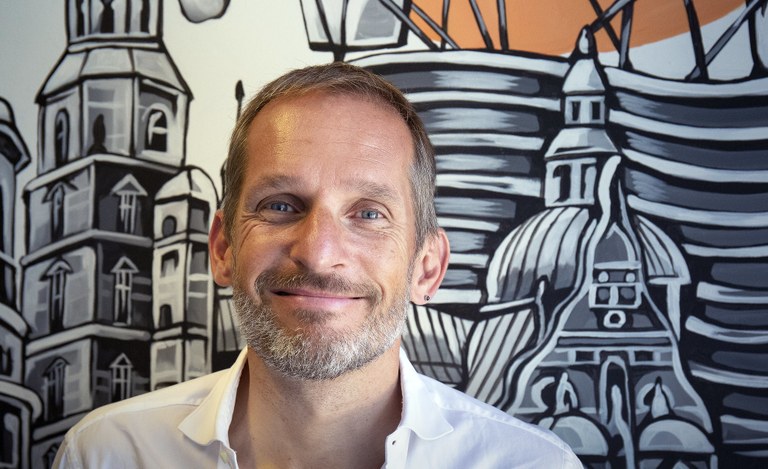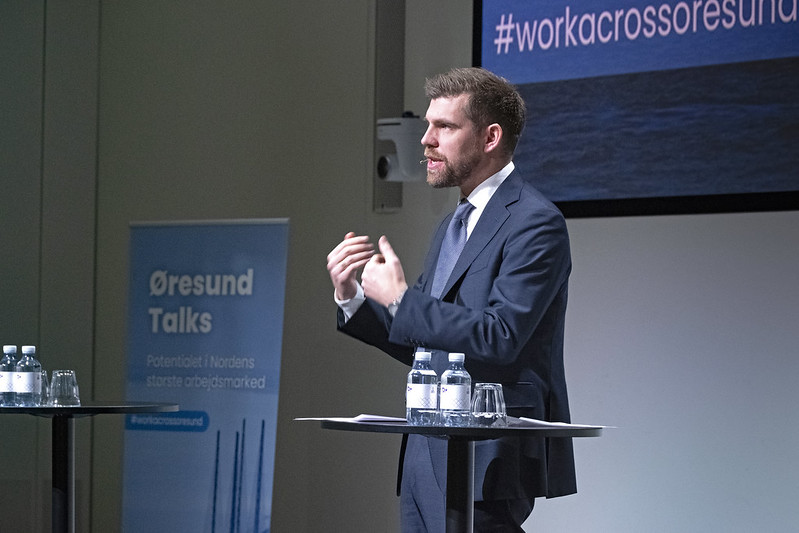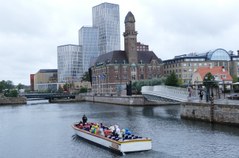Aiming for full mobility in the Nordic region’s largest labour market
The Öresund Bridge is 25 next year, yet despite the good commuting opportunities it offers there is still a way to go before the Nordic’s largest labour market is fully integrated. This year, Sweden holds the Presidency of the Nordic Council of Ministers, and greater mobility in the Nordic region is a top priority.
Win-win. The English expression could be heard repeatedly during this year’s first Öresund Talks 2024 conference, which was held recently in Copenhagen. The theme was “The Potential in the Nordic region’s largest labour market”. The organiser was The Öresund Bridge, whose motto is “Together we build bridges”.
The debate centred around the question of why it is still harder to commute between Copenhagen and Malmö than between Copenhagen and Roskilde or between Malmö and Lund, when both countries have so much to gain from a common labour market.
In real terms, this could amount to billions in profit for the two Nordic countries. According to calculations made by Greater Copenhagen, a fully integrated labour market across Öresund could result in an annual profit of up to 2.9 billion Danish Kroner (€389m, 2019 figures) for the Swedish and Danish economies combined.
Project underway
The OECD and the European Commission’s Directorate General for Structural Reform Support (GD REFORM) have been commissioned by the Capital Region of Denmark to investigate how labour market integration in the Öresund region can be improved.
Tilde Ussing from the OECD joined the conference online to talk about issues that might create barriers to labour market integration in a border region like the Öresund region. She mentioned regulations for working from home, pensions and digital accessibility, as well as regulations for residence and work permits.
Tilde Ussing also said that while the infrastructure in the Öresund region is present, there is a labour shortage on the Danish side despite the existence of many jobseekers living within commuting distance from Denmark’s capital region.
In Skåne in southern Sweden, some 61,400 jobseekers were registered with the Swedish Public Employment Service. Many of them are non-EU citizens, which can be a deal breaker when it comes to commuting across the border between Denmark and Sweden.
15 requests a week
Maria Bergström and Peter Karancsi represent the Swedish Public Employment Service at Öresunddirekt’s Malmö offices. Both are Eures advisors and specialists in international recruitment.
“We get a considerable amount of requests from non-EU citizens with Swedish residency permits who have been offered jobs in Denmark or who want to explore the possibilities of working across the strait. We get around 15 of these a week,” Maria Bergström tells the Nordic Labour Journal.
She understands that jobseekers might feel frustrated when they cannot accept a job 30 minutes away because of existing regulations between Sweden and Denmark, while at the same time, there is talk of an integrated labour market and the vision that the Nordic region should become the world’s most integrated region by 2030.
“Many third-country citizens who get in touch have no chance of fulfilling the Danish rules for obtaining a Danish work permit. The jobs they apply for are not part of the Positive Lists [a list of professions experiencing a shortage of qualified professionals in Denmark] – they want to work in the service sector – in restaurants and hotels. These jobs also do not pay enough to meet Danish demands,” says Maria Bergström.
She refers to Danish labour market regulations for third-country citizens. The Nordic Labour Journal has written about these regulations here.
“It is difficult on many levels that high demands prevent people from being hired,” says Maria Bergström.
“First and foremost for the individual person of course. But it is also hard for Danish employers, who cannot fill their vacancies.”
Perhaps a bilateral agreement between Sweden and Denmark could help more people get work on the other side of the strait, wonders Maria Bergström.
“A solution like that ought to be a win-win for both countries.”
Danish employers need more people
There is a considerable labour shortage in Denmark and it will remain for several years to come. Fresh figures from Danish Industry (DI) the country’s largest industry organisation, show that half of all Danish companies will suffer from labour shortages until 2030.
Among the employers, one of the most popular measures to fix the shortage is to do more to hire more foreign workers, writes DI.
Red tape worries employers
Greater Copenhagen – a Danish-Swedish political collaboration that aims to make the region “a global centre for growth, sustainable solutions and innovation” – is driving business policy issues. The members count 85 municipalities and four regions on both the Danish and Swedish sides.

Tue David Bak, CEO of Greater Copenhagen. Photo: Thea Wiborg/News Øresund.
“Danish employers are very positive to labour from Sweden. But the outdated Öresund Agreement, which regulates taxes and pensions for those commuting across the strait, poses problems,” says Tue David Bak, CEO of Greater Copenhagen.
“Employers are punished economically, for instance, when employees work from home, due to the rules governing the payment of preliminary taxes. This has a deterrent effect, which is why the revision of the Öresund Agreement must be completed now. The tax and pension regulations in the agreement that make things difficult for employees pose a problem for employers too, because they complicate the recruitment process."
“It is also important for Danish employers that it becomes easier for third-country citizens to accept jobs across the border," says Tue David Bak.
Increased integration a top priority
On 1 January, Sweden took over the Presidency of the Nordic Council of Ministers. Jessika Roswall, the Swedish Minister for Nordic Cooperation (the Moderate Party) tells the Nordic Labour Journal in an e-mail:
“There is significant potential in the Öresund region, and of course, I want to see a fully integrated Danish-Swedish labour market in the region. This would benefit not only individuals or companies. It creates tax revenues for Denmark and Sweden, attracts investors and entrepreneurs and enhances competitiveness.”
What the Nordic Council of Ministers has planned in terms of concrete action is not yet officially known, but the debate on increased integration has already begun, writes Jessika Roswall.
“Last autumn, when I visited the Öresund region, we discussed these opportunities. Sweden and Denmark both agree more can be done. It must become easier to study and work across the borders, and that is why Sweden will focus on getting rid of border barriers and facilitate increased mobility and integration during the Swedish Presidency.”

Morten Dahlin became Denmark’s new Minister for Nordic Cooperation after a government reshuffle on 23 November last year. He represents Venstre, The Liberal Party of Denmark, and is also Minister for Ecclesiastical Affairs plus Minister for Cities and Rural Districts. Photo: Johan Wessman, News Øresund.
Jessika Roswall did not participate in the conference. But Morten Dahlin did. He is Denmark’s new Minister for Nordic Cooperation representing Ventstre, The Liberal Party of Denmark.
The Nordic Labour Journal got a short interview with him at the conference. In response to the question about whether the Danish requirements for work permits for third-country nationals are too strict, he replied:
“There needs to be a balance between Denmark’s immigration policy and the policy that I advocate as Minister for Cooperation. We have recently lowered the monetary thresholds, but have not yet seen the full effects of that measure.”
- Öresund Talks
-
Organised by The Öresund Bridge and held at Industriens Hus in Copenhagen on 26 January. Sweden’s ambassador to Denmark Charlotte Wrangberg, Denmark’s ambassador to Sweden Kristina Miskowiak Beckvard and the Öresund Bridge CEO Linus Eriksson spoke about opportunities and challenges for the Öresund region. To the far left, moderator Trine Grönlund.
- Summer meeting in Malmö presents final report
-

The Nordic labour market ministers will mark the 70th anniversary of the common Nordic labour market, and what it has meant, during an anniversary event in Malmö on 18 and 19 June.
This will also be the venue for the publication of the strategic review of border barrier issues. The Nordic cooperation ministers launched the review in order to see whether more concrete solutions to getting rid of border barriers can be found.
 Follow us on Facebook
Follow us on Facebook
